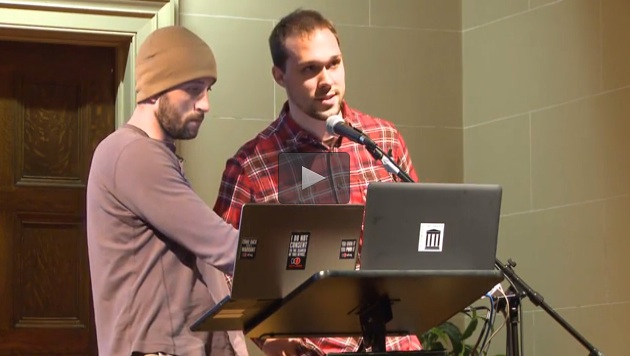 Garrett Robinson (Lead Developer, SecureDrop) will be presenting at Aaron Swartz Day, November 8th. (Reception 6pm – Speakers 7pm sharp!)
Garrett Robinson (Lead Developer, SecureDrop) will be presenting at Aaron Swartz Day, November 8th. (Reception 6pm – Speakers 7pm sharp!)
SecureDrop is a Tor-based open source whistleblower submission platform that was originally prototyped by Aaron Swartz and Kevin Poulsen (called “DeadDrop” and later “StrongBox,” when implemented by the New Yorker. It was taken over by the Freedom of the Press Foundation in October 2013.
I had a chance to speak with Garrett Robinson briefly, and get the scoop on the ongoing relationship between the Aaron Swartz Hackathons and SecureDrop.
Lisa:
Please tell us more about SecureDrop at last year’s Aaron Swartz Hackathon. You mentioned that it ended up being very productive for SecureDrop’s development.
Garrett:
Sure. Last year’s Aaron Swartz Memorial Hackathon, in November 2013, was an incredibly exciting weekend that SecureDrop benefited immensely from. I had just accepted the offer to take the role of lead developer on SecureDrop, and so I wasn’t quite sure what to expect from the event. Imagine my surprise when over 30 people showed up on the first day (Saturday), and around 15 on the second! More than that, many of the people who showed up were skilled developers and committed to the cause behind the project. It was the most productive hackathon I have ever attended, let alone been a part of leading (along with Yan Zhu, Jack Singleton, and many others).
Lisa:
Could you explain a little about why you feel these hackathons are such a fitting tribute to Aaron?
Garrett:
Sure. When we took over SecureDrop, the code that we received was barely complete and very messy – just enough to express the big idea. Aaron was a visionary with an endless supply ideas, and he seemed to be constantly churning them out, prototyping them to the bare minimum, and letting others take them on, refine them, improve them. Hackathons are like that too – a constant refinement, churn.
It’s like a dozen sculptors all working on the same block of material simultaneously. It might not look exciting to a casual observer – just a lot of people typing on their laptops, drawing on whiteboards, and talking. But to a participant, there is a kind of collaborative dance going on, and it takes refined processes and care to avoid stepping on other people’s toes as you go.
There is a great satisfaction in improving some part of the project and sharing it with others, hearing the collective murmurs of appreciation at a bug fixed or a bit of workflow eased. There is also excitement in going off in new directions, and taking radical departures, seeing those ideas come to life on someone’s smudged
laptop screen. I think that energy, creativity, and the inclination to dive right in and start doing are what make these hackathons a fitting tribute for Aaron.
Lisa:
Last year’s Aaron Swartz Hackathon went so well that you’ve started up hackathons on a regular basis, to enable more folks to contribute?
Garrett:
Yes. Since the very positive experience at the first hackathon, we have continued hosting regular “hack nights” approximately biweekly, and have had several weekend-long hackathons. This is always a great time for all of the core developers to get together. We debate things, show each other the cool stuff we’ve been working on, do code reviews together, which makes them much more efficient and effective, and just joke around and socialize. We also often get newcomers or infrequent contributors, and we introduce them to the project, answer their questions, and, if they’re interested, try to find a project that they can work on.
Now that I have recently joined Freedom of the Press Foundation full time, we will be having more regular hack nights. I am also going to work hard to establish connections and follow up more quickly and thoroughly with contributors, as a way of improving and expanding SecureDrop as an open source project. All of this was in some way inspired by the initial awesome experience that we had at that Aaron Swartz hackathon back in November.
Lisa:
Why is having something like SecureDrop so vital in a functioning democracy? You mentioned in your talk last year (linked) about how important it is that we have what you called an “adversarial press.” Could you elaborate a bit on that please?
Garrett:
In our increasingly online and networked society, information is incredibly powerful. We have seen an increasing willingness to crack down on the leaking of information, especially when that information may be damaging or embarrassing to powerful people and organizations. We have seen the Obama administration’s unprecedented crackdown on whistleblowers, with the most recent development being the Supreme Court’s rejection of Jame’s Risen’s appeal in United States v. Sterling, which sets the stage for him to potentially be imprisoned for refusing to testify against a source. SecureDrop is designed to protect sources and journalists, from these and other threats, to allow them to continue to provide the information that informs public debate and the democratic process.
Additionally, we hope that empowering whistleblowers and journalists has a similar counter-effect on those in power. If they cannot trust that something unethical or illegal will stay secret, they may think twice before doing it in the first place.


